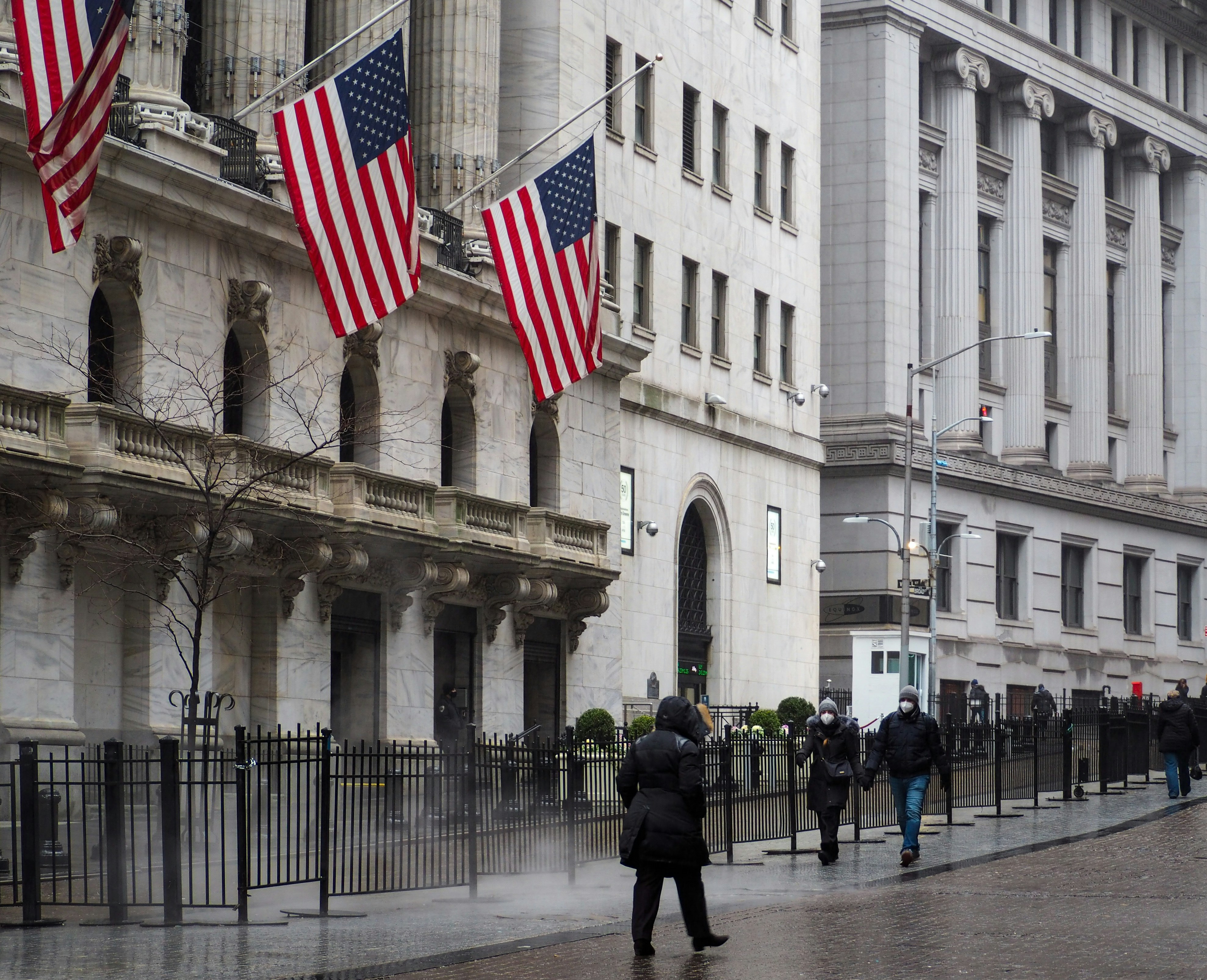
Market Update
06.02.2024
What happened last week?
US
- The Federal Reserve (the Fed) kept interest rates unchanged.
- The US Treasury said it plans to hold some of its biggest-ever debt auctions.
Europe
- The eurozone economy unexpectedly avoided a recession in the second half of 2023.
- Inflation in the bloc eased slightly in January, but services inflation stayed elevated.
- The Bank of England (BoE) kept rates unchanged but opened the door to cuts later this year.
Asia
- China slid further behind the US in the race to be the world’s biggest economy.
What does this mean?
What does this mean?
The Fed opted to leave its benchmark interest rate unchanged at a 23-year high – its fourth straight decision to stick with the current 5.25%-5.5% range. The move was widely expected by traders, who are nonetheless wondering just when the Fed might start making the 0.75 percentage points in rate cuts it’s been hinting about for this year. The market odds for a cut at the next meeting in March had climbed to 1-in-2 in recent months, as inflation cooled toward the central bank’s target. However they plunged last week to just 1-in-3 after the Fed chair suggested those hopes were a bit too eager.The US economy, after all, is still going strong even with high rates, and the last thing this central bank wants is an inflation sequel.
The eurozone economy flatlined in the last three months of 2023, notching 0% growth over the three months before, and dodging a technical recession (defined as two consecutive quarters of contraction) by the slimmest of margins. Experts had expected the economy to shrink in the October-December period by 0.1%, matching the July-September period, mostly because of the drag created by high interest rates. But muscular growth in Italy and Spain helped offset feeble output in Germany and a flatlining in France. Germany, usually the bloc’s powerhouse, saw its economy shrink by 0.3% last quarter, bogged down by falling investment in construction, machinery, and equipment.
Overall inflation across the eurozone decelerated to 2.8% last month – in line with economist expectations. However core inflation, which strips out volatile energy and food prices, fell to just 3.3%, a little higher than the 3.2% the consensus was hoping for. Inflation in the labour-intensive services sector – a metric that the European Central Bank (ECB) watches closely – held steady at 4%.
Taken together, it’s not enough to cause a stir at the ECB. The Bank says it wants to see signs that pay growth is cooling before it lowers borrowing costs, and the elevated pace of price gains for labour-intensive services could be a sign that the job market is still running a bit hot, warranting a go-slow approach. This may mean traders need to temper their enthusiasm: they’re expecting the ECB to drop its 4% deposit rate to just 2.5% by the end of the year – with the first trim coming by April.
The BoE seemed to tear a page from the Fed’s book, holding its borrowing costs at 5.25% for the fourth consecutive meeting and hinting about interest-rate cuts later this year. After all, these rate hikes were all about combatting some super-high price rises, and the central bank has said it sees inflation dipping to its 2% target in the second quarter, thanks to tumbling energy prices. The problem is that it then expects inflation to bounce up to almost 3% as the impact of cheaper energy fades and underlying price pressures in services and wages continue. So traders who expect an aggressive run of interest rate cuts could find themselves disappointed. On the flip side, lower inflation and lower interest rates may well buoy the economy in 2025.
Finally, China hit some hurdles. Everyone expected it to overtake America sometime in the early 2030s in the race to become the world’s biggest economy. However this is looking more and more like a pipe dream, especially after the US widened its lead last year. The American economy grew by 6.3% in nominal terms – that is, unadjusted for inflation – in 2023, easily outrunning China’s 4.6% gain. Consequently, the size of China’s economy relative to the US fell to 65%, down from its peak of 75% at the end of 2021. Some of that outperformance is because of elevated inflation in the US, but the figures highlight a significant underlying trend: the world’s number one economy is emerging from the pandemic in a stronger position compared to China.
This week’s focus: How to plug a deficit, with more debt
You might think that the Fed’s interest rate decision was the headline act for bond market investors last week. But there was another key event that might have slipped past your radar: the Treasury’s announcement on its borrowing plans.
Every quarter, the Treasury announces how much funding it will need for the upcoming six months. Because of the enormous debts being racked up by the US government, these announcements have now become market-moving events. More borrowing means more government bonds that will flow into the market. And the more bonds issued, the lower their prices and the higher their yields – the return investors expect every year until a bond’s maturity.

For this quarter, the Treasury actually dropped its estimated borrowing by some $56 billion, because of higher net inflows and the fact that it ended up with more cash on hand at the start of the quarter than expected.
The remaining $760 billion in predicted required funding is still among the most ever announced in a quarter. That’s because the government’s budget deficit – the difference between what it makes in taxes and what it spends – is only widening, with everything from tax cuts to defence costs to economic stimulus to blame. Now, the Treasury has been selling bonds to plug the gap, but that’s only adding to the US’s eye-wateringly huge debt pile – at a time when high interest rates are ramping up the cost of paying back what’s owed and worsening the deficit in the process. So, a vicious cycle continues: the more bonds are sold, the more interest becomes due on them, the worse the deficit gets, and repeat.

The Week Ahead
- Monday: China PMIs (January). Earnings: McDonald’s, Caterpillar, Palantir.
- Tuesday: Japan household spending (December), eurozone retail sales (December). Earnings: Eli Lilly, Amgen, Spotify, Ford, Gilead Sciences.
- Wednesday: US trade balance (December). Earnings: Alibaba, ARM, PayPal, Disney, Uber.
- Thursday: China loan growth (January), China inflation (January). Earnings: Philip Morris.
- Friday: Earnings: PepsiCo.
This document is provided to you for your information and discussion purposes only. It is not a solicitation for business or an offer to buy or sell any security or other financial instrument. Any information including facts, opinions, or quotations, may be condensed or summarised and are expressed as of the date of writing. The information may change without notice and Trusted Novus Bank (“TNB”) is under no obligation to ensure that such updates are brought to your attention. Past performance is not a guide to future performance.
This document has been prepared by TNB from sources TNB believes to be reliable but TNB does not guarantee its accuracy or completeness and does not accept liability for any loss arising from its use. TNB reserves the right to remedy any errors that may be present in this document.
Trusted Novus is registered in Gibraltar under number 3207. Its registered address and principal place of business is: Trusted Novus Bank Limited, 76 Main Street, Gibraltar GX11 1AA. It is regulated by the Gibraltar Financial Services Commission (Permission Number 3207) to provide Banking and Investment Services. TNB is a member of the Gibraltar Deposit Guarantee Board (www.gdgb.gi) and the Gibraltar Investor Compensation Scheme (www.gics.gi).